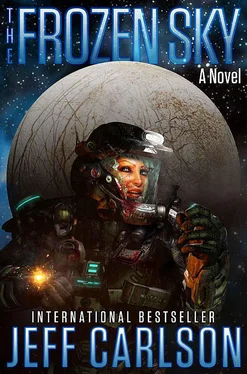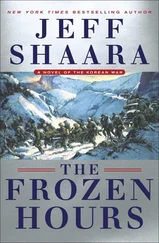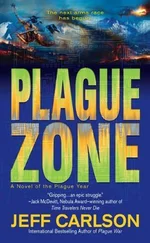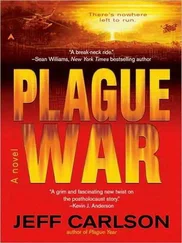Hidden beyond the obstruction were sunfish. The rock echoed with their shrieks, which grew louder and louder.
Vonnie grimaced. The reality was that mecha were ideal for this world. She couldn’t have fit into those holes even if she’d had the guts to try, and, worse, she expected the sunfish to greet the probes with violence. They all did.
“How far away is our next team?” Koebsch asked.
“110 and 111 are five kilometers out,” Frerotte said. “114 and 115 are even further. I didn’t want to pull them from their grids.”
The sunfishes’ screaming resolved into a physical presence. Radar identified three contacts — then four — seven — eight. Tom and Jill led the pack. They fluttered through the jagged rock, their voices flooding every crevice.
112 and 113 answered them. If Pärnits was right, the probes’ tone was welcoming, but the voices of the sunfish increased in pitch, exceeding frequencies over 100,000 Hertz. Their screams became a war cry.
“Here we go,” Koebsch said.
Four sunfish spun out of a gap in the ceiling and latched onto the rock above the probes, clenching their arms, their bodies poised to leap again. It was the same menacing pose Tom had assumed in the tunnel.
“They’re going to attack,” Frerotte said, but Vonnie said, “No, they always display aggression. You need to do the same.”
“She’s right. I can improvise those body shapes,” Metzler said. At his command, 112 and 113 mimicked the sunfish, drawing themselves into predatory, piston-like shapes.
Four more sunfish emerged from a hole in the wall. Tom was among this group. They seized positions on the rock overhead. The probes were surrounded.
From this position of strength, four sunfish showed the undersides of their arms — two arms each — two sunfish from each quartet. Intricate patterns rippled through their pedicellaria and tube feet.
“They’re emitting scent!” Metzler said. “Frerotte, take over 113. Talk to them. I want 112 working on sample capture and analysis.”
“Roger that,” Frerotte said. Sweeping his gloves into his display, he led 113 through a new dance. The probe lifted two of its arms like the sunfish.
“We’re not going to be able to match their scents,” Pärnits said. “They’ll realize something’s wrong.”
“They know the probes are different,” Vonnie said. “Don’t run. If we try to get away, they’ll catch us. Let’s see what happens. Keep talking.”
Beside her, Metzler flashed a smile.
Did he like hearing her argue with Pärnits? There wasn’t time to read his expression. This close to the sunfish, every second was a gold mine. The probes’ telemetry filled with X-rays, linguistic algorithms, and 112’s first chem reports.
“Wow!” Metzler said, laughing.
Everyone was entranced. They were spellbound, even Koebsch. The moment was so exceptional he’d forgotten himself and his prudent nature.
“I think they’re accepting us,” Metzler said.
“The computers think so, too,” Pärnits said, highlighting ten clips on the group feed.
He ran an overlay of four different sunfish repeating the same wriggles through their pedicellaria. It was a contracting motion. It looked like a circle closing into a dot.
“That could mean ’Come with us’ or ’Go inside,’” Pärnits said.
“Tell them ’Yes,’” Koebsch said.
Frerotte ordered both probes to spread their arms and curl each tip upward. Like Metzler, he was smiling. Everyone was talking too loudly now, sharing the same electricity.
Vonnie turned at the chime of an alarm. “Wait. There’s movement back where we left our spies.”
“Oh!” Ash cried.
Tom’s sunfish fell on 112 and 113 like rain. Most of the ESA crew shouted as if the probes were their own bodies.
Beaks and arms filled their displays. The sunfish tore through the probes’ false skin, cutting relays and sensors. Tom’s beak scraped the metal beneath. The noise was a grating squeal until Frerotte dimmed the volume.
“Don’t fight them!” Koebsch yelled. “Don’t fight!”
The sunfish destroyed both probes. They were unable to crack or dent the mecha’s alumalloy bodies, but they wrenched several arms loose, then dug into the open sockets with their arm tips. They yanked at the machinery inside even when it cut and tore their pedicellaria.
Did they intend to keep the ravaged metal and plastic? Before the last signals from 113 went dead, the sunfish hooked their arms around the squashed gears and fragments of alumalloy.
“What’s happening with our spies?” Metzler asked as Vonnie scrolled through her display.
She couldn’t let herself feel anything more than tight concentration. She was discouraged, but the real surprise was that the sunfish had interacted with the probes for eighty-one seconds. Now they shocked her again.
“Their colony must be larger than we thought,” she said.
Near the cavern where the sunfish had built their retaining wall, Sue led a new horde within range of the spies’ sensors. There were sixteen of them. Twelve hugged rock clubs against their bodies.
“How can there be so many sunfish?” Koebsch said. “I thought there isn’t enough food.”
“We need to send mecha down to the ocean,” Vonnie said. “What if it’s loaded with fish like those eels NASA found? They might get most of their food there.”
“The ocean’s too far away,” Koebsch said. “They’d need days to transport eels or fish back to the colony.”
“If they freeze their food, that wouldn’t matter.”
“Yes, it would,” Koebsch said. “They’d spend more calories than they’d gain dragging their prey through the ice, and they’d probably have to fight other tribes for it. They’re too high for the ocean to matter.”
“Not if there were geysers and churn in the area,” Metzler said. “There might be sea life frozen in the ice around the colony. Maybe they’re mining for it.”
“An eel mine,” Vonnie said appreciatively.
That could be the missing factor , she thought. Eruptions and rip tides might push sea creatures into the frozen sky, where they’re preserved. If the sunfish located an area where storms seeded the ice with bodies, they’d have a natural food source. It might be enough to last for years or generations.
Sue’s group entered the cavern in a familiar wave formation. Half flew high. Half flew low. They rebounded from the ceiling and floor, colliding in the middle.
Then they sprang away from each other in individual trajectories. The four sunfish who weren’t carrying rocks used themselves as a centering mass. Kicking, bouncing, slamming, spinning, they propelled the others outward.
They crushed the spies with stunning precision, terminating eleven of the tiny mecha in a coordinated strike. Vonnie thought they’d turn on the rest, but they were done. They killed eleven spies without effort, then paused, leaving the majority untouched.
“That’s weird,” Frerotte said. “If they can tell our spies are there—”
“They memorized the walls!” Metzler said. “That’s what they were doing with their group song. They memorized the walls, then came back and spotted the differences. Look. They killed every spy that’s moved since they left. 4071 only changed its position by five centimeters, but they got it, too.”
Sue’s group picked at the remnants of the spies. They ate a few specks, then cinched their arms around the rest. Later, they might compare these bits of ceramic armor and nanocircuitry to the junk Tom’s pack had salvaged from the larger probes. For the moment, Sue’s pack gathered on the cavern floor.
They screeched and screeched. They were memorizing the cavern again. The group ritual also served as a warning to everything that could hear them — a cry of possessiveness and defiance. Then they fled into the dark.
Читать дальше












